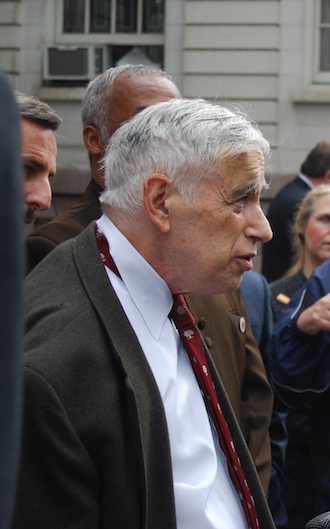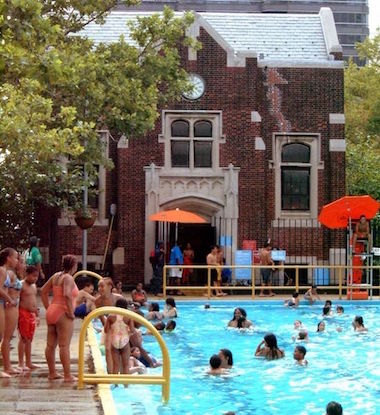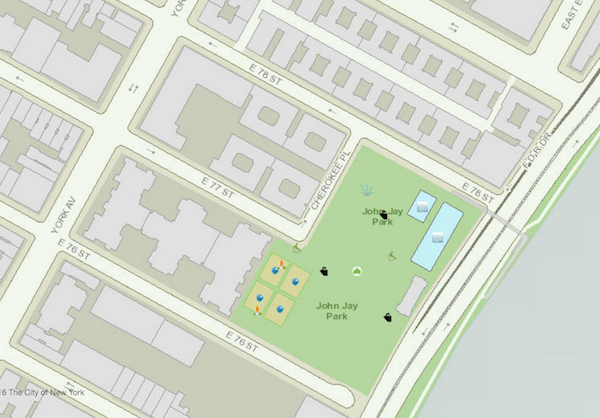
BY JACKSON CHEN | In a move that would preempt traditional practice for dedicating park facilities in New York City, residents and elected officials on the Upper East Side are pressing to rename the pool in John Jay Park after Henry Stern, the former longtime commissioner of the Department of Parks and Recreation.
During a September 8 meeting of Community Board 8’s Parks Committee, locals were joined by former colleagues of Stern’s in urging the parks department to honor what they describe as a unique legacy of hard work and dedication to the city.
Though protocol has limited such dedications to luminaries after their deaths, advocates of the pool renaming hope that the facility — inside a small city park located on little-known Cherokee Place, east of York Avenue between East 76th and East 78th Streets — can pay tribute to Stern, 81 and an Upper East Side resident, while he can enjoy the honor.
“Henry is just so deserving of the recognition by the city,” said Morgan Pehme, the former executive director of New York Civic, a watchdog group formed by Stern after his years in government. “It would be a wonderful gesture and a fitting tribute to him if we could recognize him in his lifetime with the renaming of the John Jay pool.”
Trailing behind only Robert Moses, Stern has the distinction of being the city’s second-longest-serving parks commissioner, with a 15-year tenure split between the administrations of two mayors from different political parties — under Ed Koch, from 1983 to 1990, and Rudy Giuliani, from 1994 to 2000.
The former commissioner’s career in public service, however, began much earlier — in 1957.

According to Adrian Benepe, another former parks commissioner, Stern began his 40-plus years working for the city after graduating from Harvard Law School at age 22. Despite having a law degree from one of the top schools in the country, with all the lucrative offers that could open up, Benepe explained, Stern chose to enter public service by working as a law clerk for State Supreme Court Justice Matthew Levy.
Before assuming the helm at the parks department, Stern held a variety of senior posts for two Manhattan borough presidents, a deputy mayor, and beginning in 1969 with the new Department of Consumer Affairs. He was also a Manhattan at-large member of the City Council, elected for two terms beginning in 1973 on the Liberal Party Line.
Stern himself explained that the variety in his résumé stemmed not only from good fortune but also from an independence of mind that allowed him to judge matters in front of him based on the merits and not the politics.
“I don’t know of any job that’s brought the personal satisfaction of working with different people, rich and poor,” Stern said. “I was just so happy that I chose to become a city employee.”
According to Pehme, Stern had always had a real love for public swimming pools and worked in creative fashion not only to advocate for them but also to encourage their use. To promote the pool at John Jay Park, which lies at the far east end of 77th Street, Stern would hold an annual event on July 7 beginning at 7:07 a.m. and invite New Yorkers to swim either seven or 77 laps with him to celebrate the city’s pools.
“People didn’t realize that the community pool was very nice,” Stern said. “On a hot day, it’s a lifesaver, and there’s people who can’t take the subways and go to Coney Island and the Rockaways.

As someone who frequented that pool, Stern said that for him it has served as a cultural lens into the neighborhood.
“The use of the pool has reflected the changing population of the Upper East Side,” he said. “It used to be poor kids and then they were gentrified, and the pool has increasingly a middle class swimmer base.”
All that has ever mattered to the parks department, Stern said, was that neighborhood residents had a nearby facility in which to swim. Having a pool that has provided recreational access to so many named in his honor would be humbling, he said.
“It’s an unexpected pleasure to have so many people call for this decision, so I’m deeply touched by it,” Stern said.
Pehme recalled how Stern succeeded in preserving the indoor pool at the Gertrude Ederle Recreation Center on West 60th Street by staging a swim-in.
Benepe agreed with Pehme’s assessment that Stern was a fierce champion of the city’s pools and instrumental in securing funding even during rough economic patches for the city — but also noted the former parks chief’s equally determined advocacy for trees. Stern, he said, coined the term “arborcide,” a usage later recognized in New York City Council law.
“Henry I’d call an honorary Druid,” Benepe said. “He loves trees, and he took that love of trees to a legal place and made it a criminal penalty if you remove a tree.”
Throughout his long career, Stern always made it a point to visit community board meetings and interact with residents who turned out as well, Benepe recalled. His approachable nature left many community members and elected officials with fond memories of a humble man.
City Councilmember Ben Kallos said he met the former commissioner while serving on CB8 and practicing law full time.
“He took the trouble to look up the practice, and he reached out to me and said, ‘You could do better,’” Kallos recounted, adding that two weeks later he received an offer to be chief of staff to then-Assemblymember Jonathan Bing. “When Henry Stern gives you that talking-to as a complete stranger, it ends up changing things.”
For CB8 member Barry Schneider, Stern brought great energy to the CB8 meetings he attended, the same energy that helped pave the way for many parks.
“When I was the chair of Board 8, I worked with Henry on a number of occasions,” Schneider said. “I’ve never met a more compassionate, more compelling, more dedicated, and more intellectual person than Henry Stern.”
Despite all the affection Stern inspires and the strong support for honoring him at the John Jay Park pool, one huge hurdle is the conventional practice of only dedicating park property posthumously — something formalized in department policy. According to sources knowledgeable about the push to rename the pool, Parks Commissioner Mitchell Silver is not warm to the idea.
Manhattan Borough Commissioner William Castro acknowledged Stern’s contributions to the parks department and the many communities it serves, while carefully skirting the question of the pool’s renaming.
“Henry Stern is a revered former commissioner for this agency and dear to many near and far,” Castro said. “His leadership and impact on parks is immeasurable.”
In recent years, Stern’s health has become precarious with the progression of Parkinson’s disease. His mind remains very sharp, according to Pehme, but “his body is doing him a grave injustice at this moment.”
CB8 Parks Committee, agreeing that there is no need to wait, unanimously passed a resolution at the September 8 meeting urging the Department of Parks and Recreation to honor Stern with the pool’s renaming.
“I think it would be wonderful to support this man and give him this one full honor while he is alive,” said Judy Schneider, a Parks Committee member. “I don’t think we should wait until he passes away to do something like this.”
Those advocating for the renaming note that precedent for acting at this time can be found in the David N. Dinkins Municipal Building downtown and the Ed Koch Queensboro Bridge.
“Oftentimes we do these renamings after someone who has made a difference on their street and their community,” Pehme said. “Henry Stern, a proud Upper East Sider, has made a difference in every community in the city.”

















